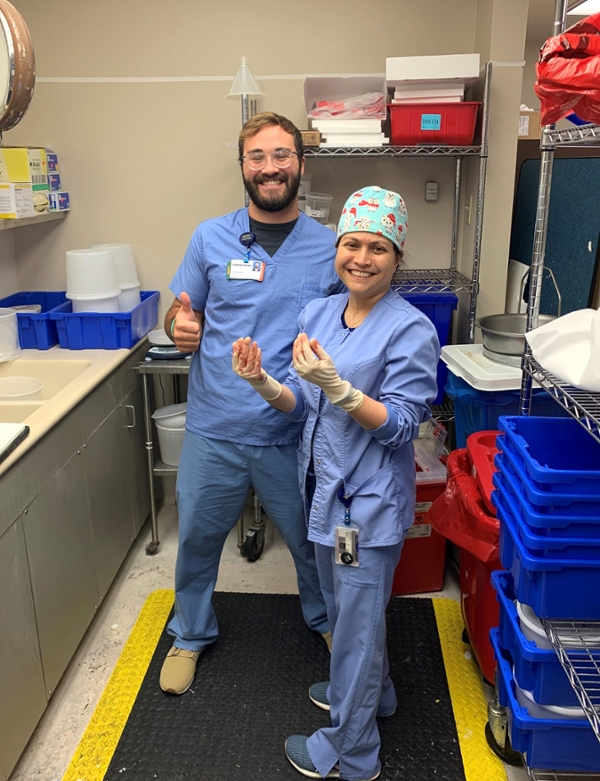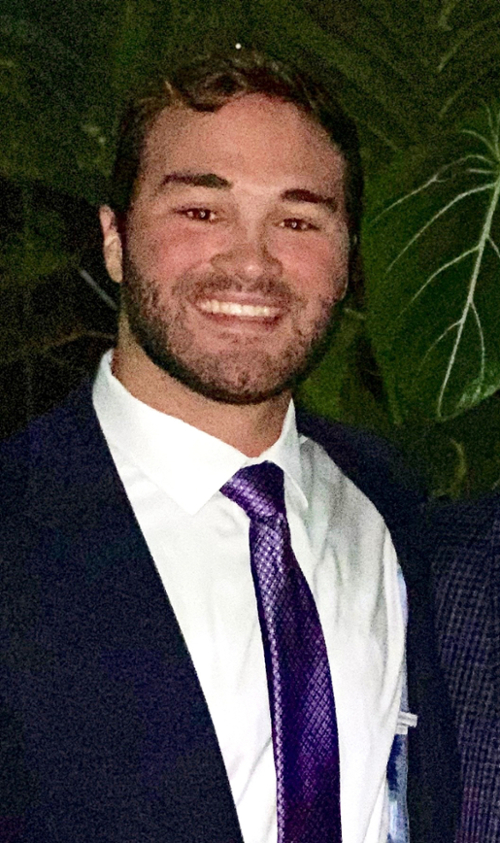Under the Microscope: Chris Prevost ’21
May 13, 2021
Tweet
By Andréa Bolt, Communications Specialist, Division of Marketing & Communications
The new academic partnership program marries the Texas A&M-Galveston Bachelor of Science in University Studies with a Concentration in Oceans and One Health with the UTMB Master of Clinical Laboratory Sciences.
During Saturday’s commencement ceremony Prevost will receive his bachelor’s degree including the minor in CLS, chemistry, and having already completed more than twenty credit hours of graduate work applied to the master in CLS. Post commencement, he will continue as a full-time CLS graduate student at UTMB.
The program is unique in both curriculum and co-ownership. Most undergraduate classes are completed at Texas A&M-Galveston, while graduate-level courses are completed at UTMB. On the Texas A&M-Galveston side, the program is housed in the Department of Foundational Sciences, aimed to appeal to students with broad science-based interests, especially in the medical, dental and veterinary fields.
It was toward the end of his sophomore year that Prevost, a San Antonio native, heard about the program. Prevost admitted initially his goal was to transfer to College Station after his freshman year to major in biomedical sciences.
“But the Galveston Campus won me over. After my first year here, I just fell in love with the atmosphere. It was easy to get a hold of professors and I liked the smaller size of everything,” he said.
After deciding to stay, he got more involved with student groups like the Aggie Gentlemen’s Society (AGS) and changed his major to Marine Sciences so he could declare a chemistry minor. He didn’t realize it at the time, but the switch set him up perfectly for CLS.

Prevost heard about the brand new program from the its coordinator, Instructional Assistant Professor Dr. Jhenny Galan.
“I had taken a few of Dr. Galan’s classes and definitely felt drawn to the program when it was first announced,” Prevost said. “I didn’t exactly know what it was but it sounded appealing to me and my interests and was unique, different.”
From Sharks to Scrubs
With Dr. Galan, Department of Marine and Coastal Environmental Science Head Professor Dr. Kyeong Park and Dr. Melanie Moser, foundational sciences department head behind him, Prevost found being the first student in a program a little less intimidating. Faculty from both universities helped Prevost choose classes accordingly and plan his program.
He began taking classes with names like immunology, pathogenic microbiology and introduction to laboratory safety protocols. Science was still the name of the game, Prevost said he just switched from “sharks to humans” or human-oriented test samples as lab subjects.
“There was really an emphasis on the importance of safety and professionalism in this program, too. You’re dealing with hazardous materials, chemicals and living pathogens. Labeling is crucial, protocols are crucial,” he said of the UTMB courses.
Prevost says he has a mind for details and is very analytical, thus he feels right at home in a lab setting. This program has also helped him realize the huge role a hospital lab plays, especially in light of a pandemic.
“The labs of the hospitals are where all the testing happens. Anything that needs a diagnostic run is sent to the lab; blood, urine, cerebral and spinal fluid, etc. Diagnostics help tell physicians what is going on so they can apply treatment. Though this position is specimen-oriented, it ultimately helps people.”
With this degree, Prevost says graduates can work in microbiology, hematology and coagulation, clinical chemistry labs, blood banks, and more.
The hands-on training, practicing with lab equipment, performing lab tests on fellow students—even perfecting how to draw blood—was “really fascinating” to Prevost and helped tie all the aspects of learning together.
“For engineering students, you go into the wave lab and apply what you’ve learned. For marine biology, you start dissecting specimens or go on a field trip. Getting to that point in this program, you start to kind of see everything come together, it all starts funneling into ‘Oh now I can see the applications behind it,’” he explained.
Prevost interned the summer before last under a pathologist at the Methodist Hospital Specialty and Transplant in San Antonio. She provided Prevost insider information, saying there’s a wave of lab specialists getting ready to retire and a dearth of incoming workers able to fill those positions.
“I think the latest statistic from UTMB is that students coming out of this program have about a 100% job placement rate, too. So the future is pretty bright when it comes to someone coming out of this program.”
###
Media contact:Communications Specialist
a_bolt@tamug.edu
More:
Read more about Health & Environment
Read more about Science & Technology
Read more about Foundational Sciences
Read more about Marine Sciences
Read more about Student Life